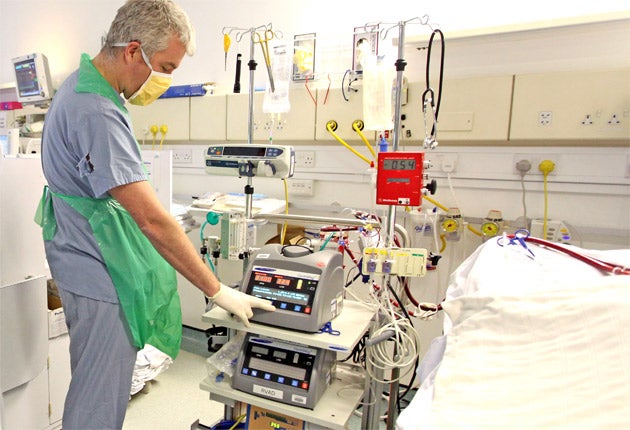Record number in intensive care with swine flu

Your support helps us to tell the story
From reproductive rights to climate change to Big Tech, The Independent is on the ground when the story is developing. Whether it's investigating the financials of Elon Musk's pro-Trump PAC or producing our latest documentary, 'The A Word', which shines a light on the American women fighting for reproductive rights, we know how important it is to parse out the facts from the messaging.
At such a critical moment in US history, we need reporters on the ground. Your donation allows us to keep sending journalists to speak to both sides of the story.
The Independent is trusted by Americans across the entire political spectrum. And unlike many other quality news outlets, we choose not to lock Americans out of our reporting and analysis with paywalls. We believe quality journalism should be available to everyone, paid for by those who can afford it.
Your support makes all the difference.Swine flu has surged in the past five days with the number of cases requiring intensive care 70 per cent above last year's peak, the Chief Medical Officer said yesterday.
The latest official figures show there were 302 people being treated in intensive care with "confirmed or suspected influenza" compared with 180 at the height of the 2009-10 pandemic. Most of those in hospital were suffering from H1N1 swine flu, officials said.
More than nine out of 10 were under 65, including 36 children under 16. Flu is normally most severe in the over-65s.
Dame Sally Davies, acting Chief Medical Officer, said the NHS was coping and there was no shortage of beds. The 302 beds occupied by flu patients represented less than one in 10 of all intensive care beds, she said.
"What makes this an unusual year is the [deaths] are in children and adults below the age of 65, whereas seasonal flu [deaths] are predominantly in the over-65s." She called on pregnant women, who are four times more likely to need hospital treatment for swine flu than the general population, to get vaccinated as well as others with chronic conditions such as asthma and diabetes and people aged over 65.
Vaccination rates against flu are running at historically low levels this year after the annual publicity campaign was axed as part of the government cuts. Dame Sally said: "We want more people to come forward for the vaccine, particularly pregnant women."
Andrew Lansley, the Health Secretary, briefed the Cabinet on the flu situation yesterday morning. David Cameron later told a press conference at 10 Downing Street: "While obviously... the number of flu cases has doubled in the last week, there is still plenty of capacity in the NHS." He said that Mr Lansley had "a good grip on the situation".
So far this flu season, 14 people have died with confirmed swine flu and another three from flu type B. The figure is expected to rise when the weekly update is published tomorrow. Last year, 474 people died from swine flu.
Professor Peter Openshaw, director of the Centre for Respiratory Infection at the National Heart and Lung Institute, Imperial College London, said: "From around the country, reports from frontline staff are showing unprecedented levels of hospitalisation with severe flu in high-risk adults."
He added: "Pregnant women should get the vaccine regardless of the stage of their pregnancy. Most importantly, the vaccine protects not only the mother and the unborn child, but also the newborn baby. All the experts are agreed: the vaccine is safe."
John Healey, the shadow Health Secretary, accused the Government of doing "too little too late". "The Health Secretary is playing catch-up. The only attention he's paid to the preparations for this winter's flu outbreak is to axe the autumn advertising campaign to encourage people to get vaccinated and make them aware of the risks. He made the wrong judgement and it's left too many people without the flu protection they should have," said Mr Healey.
The Department of Health said £177,000 was spent on advertising seasonal flu vaccination last year.
Join our commenting forum
Join thought-provoking conversations, follow other Independent readers and see their replies
Comments